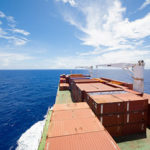Exporters have pitched for an Indian shipping line of global size and said the Budget FY24 would do well to provide for the initial investments.
It will not only help in improving India’s export competitiveness, but also save billions of dollars for the government, Ajay Sahai, DG and CEO of the Federation of Indian Export Organisation, said.
“This is our most important recommendation that we have sent to the government that India should have a shipping line. We have Shipping Corporation of India with a total market share of not more than 5%, and that is also getting disinvested. I think this is the right time to develop an Indian shipping line of global size,” Sahai said.
It will also ensure that India is not at the mercy of foreign shipping lines. According to Sahai, tax breaks are required to promote private investments in the shipping industry and cited that many shipping lines across the globe enjoy tax relief.
According to FIEO, in 2021, Indian exporters incurred expenses to the tune of $84 billion for freight. The figure may have gone up to $100 billion in 2022. When the target to attain $1 trillion exports will be met, the freight cost remittances will likely be above $150 billion. “If India will have a shipping line which gets 20-25% of the business, then we can save $35-40 billion a year,” an exporter said.
During the pandemic, it was not only the global trade that got impacted but entire world witnessed a container crunch. Since there were not many companies supplying these containers the demand went up significantly.
According to reports, the global shipping container market size is close to $7 billion and is expected to be more than $12 billion by 2028. “There must be incentives for container production, or PLI for the manufacturing of containers and in fact more allocations in this regards should be made by the ministry,” Saikat Dalmia, president of PHD Chamber of Commerce, said.
According to Sahai, there are quite a few players who have got into container manufacturing already. But the problem is inadequate production of corrugated steel, which is used in making containers. “The government should take steps to allow its seamless import or talk to steel companies to produce corrugated steel in adequate quantity. If there is a requirement of lesser duties, those demands should be looked into,” he said.
Dalmia raised another concern regarding poor export infrastructure and congestion at the ports. The first need is to remove congestion at ports and improve export infrastructure, he said.
Source: Hellenic Shipping News





